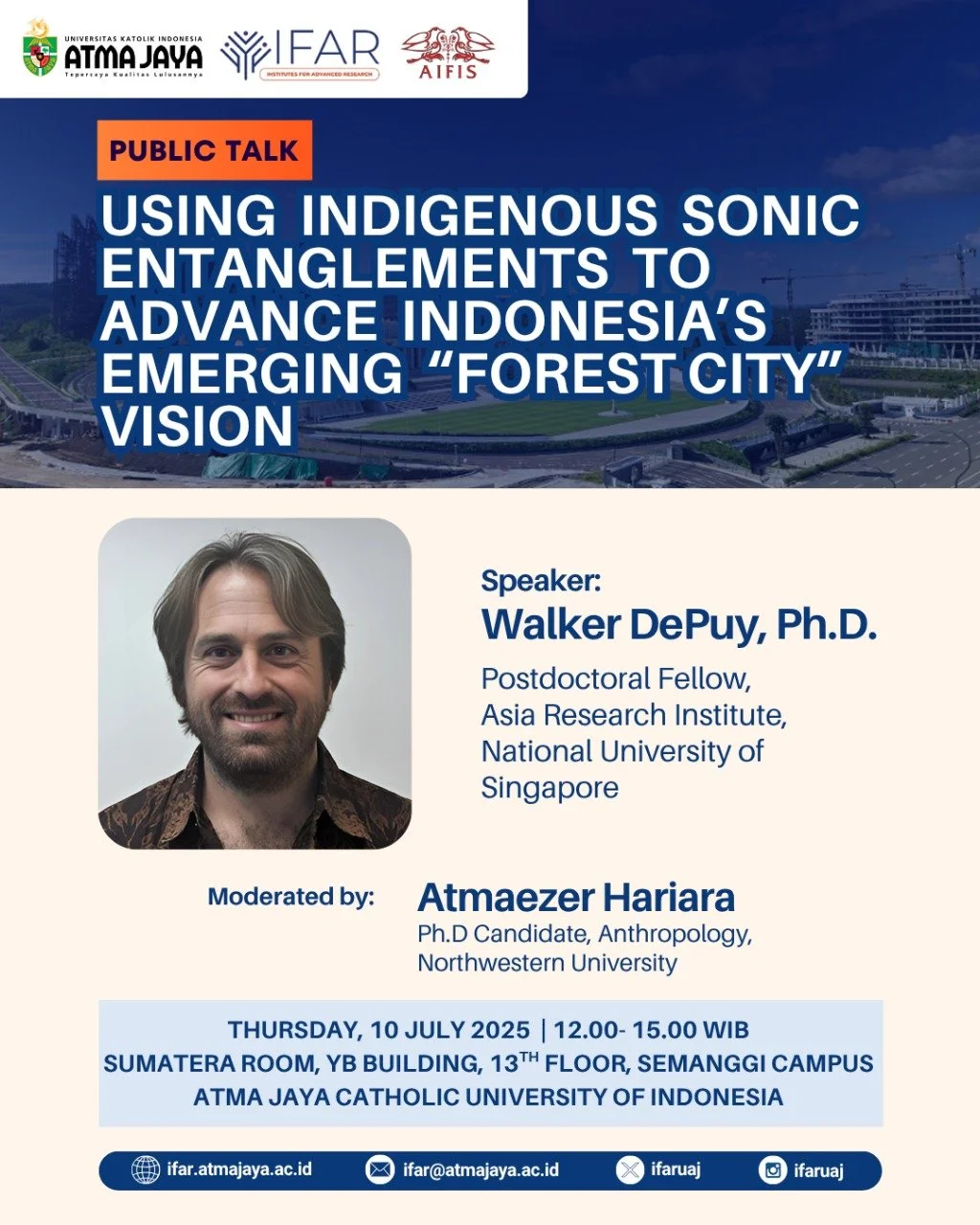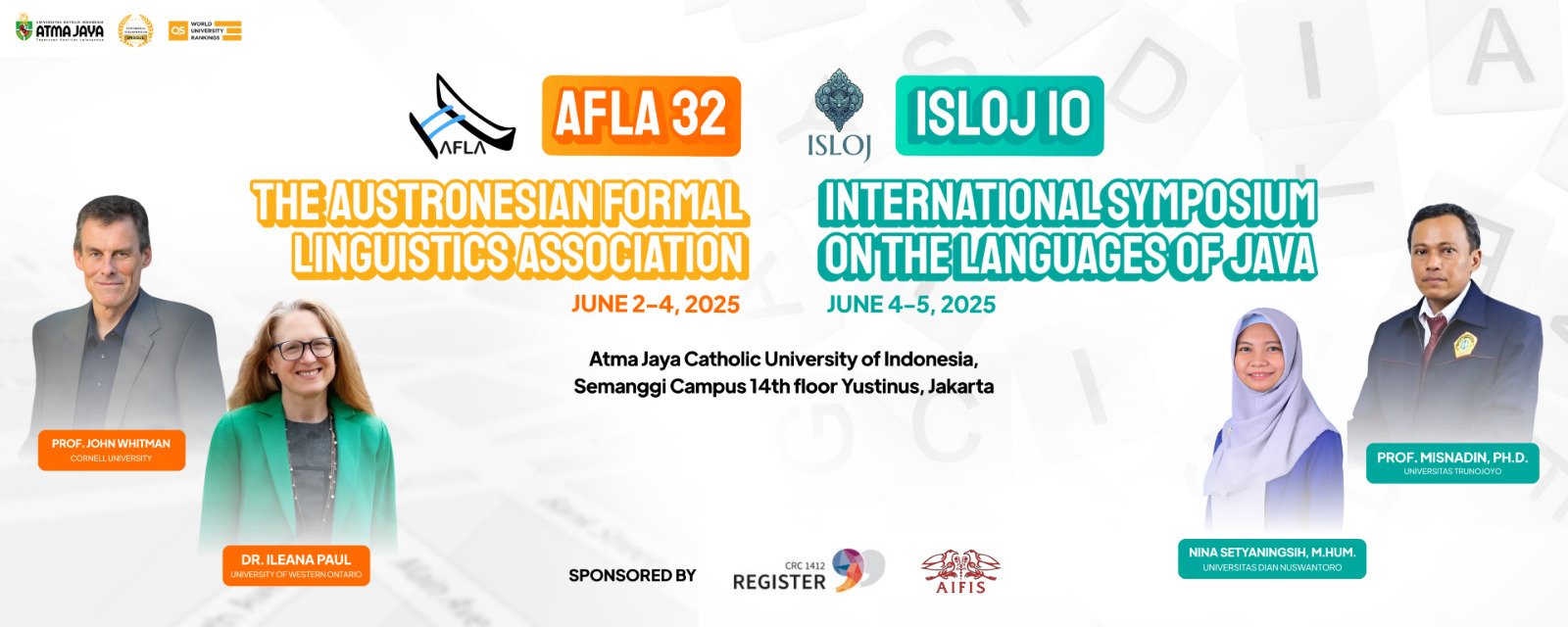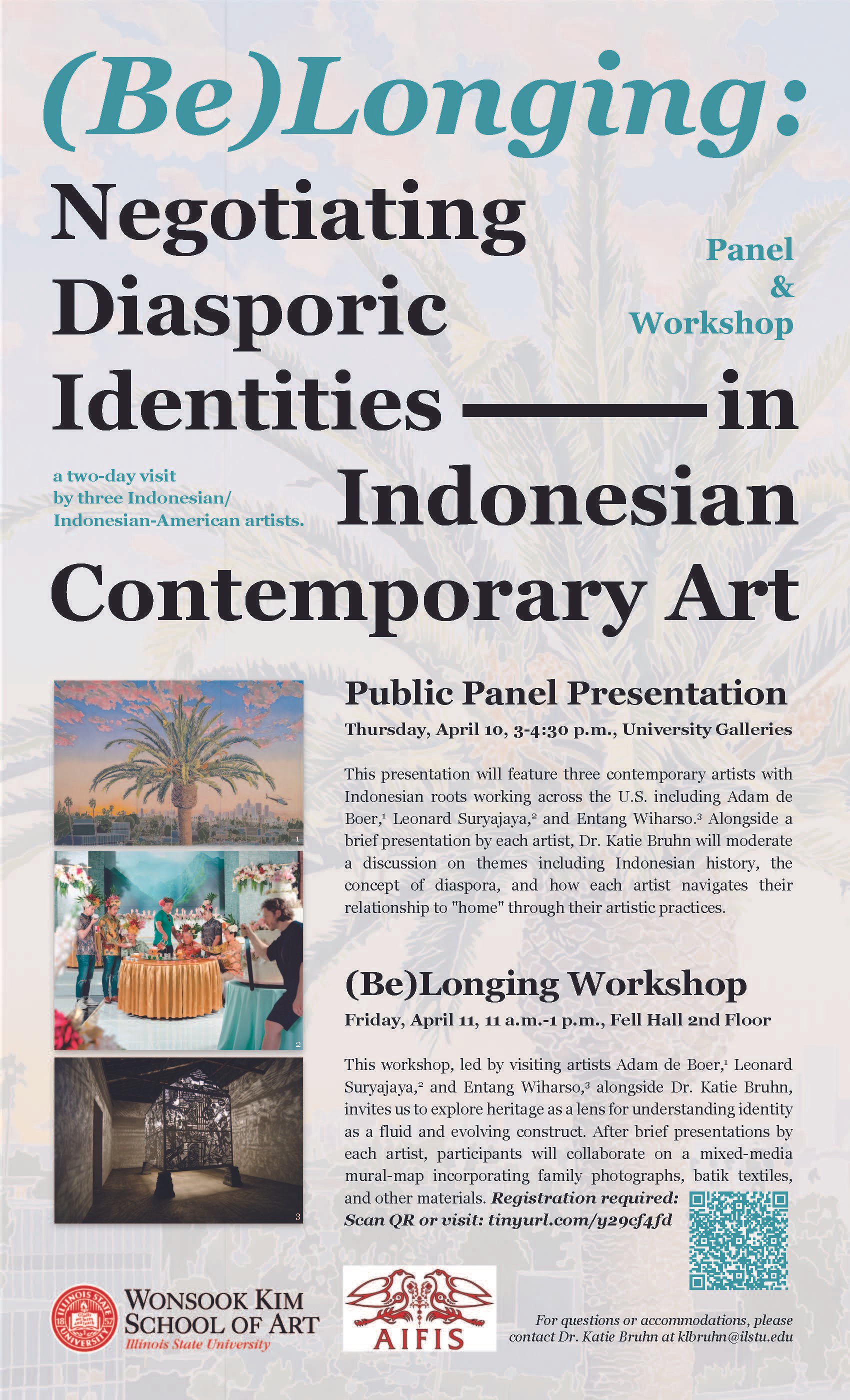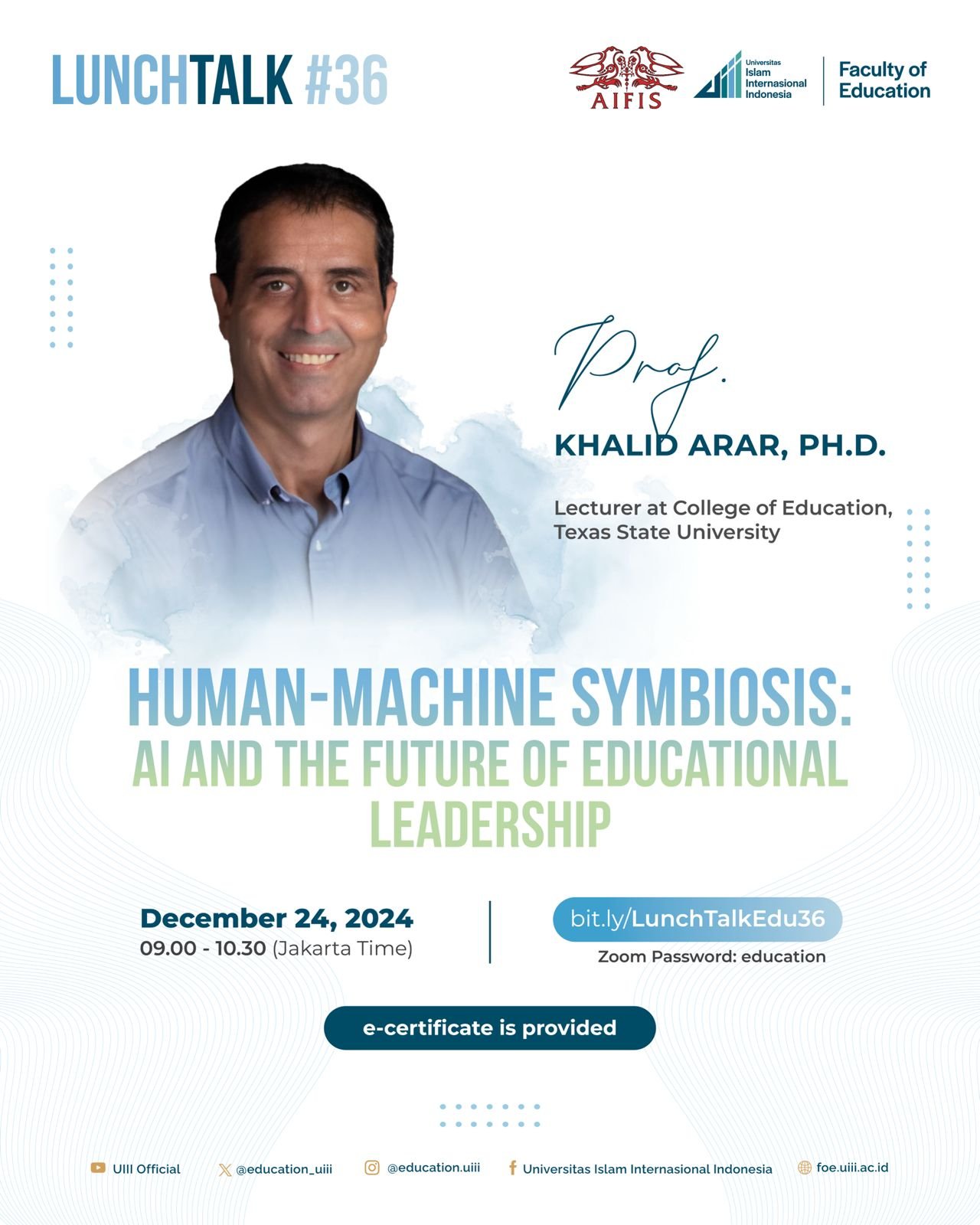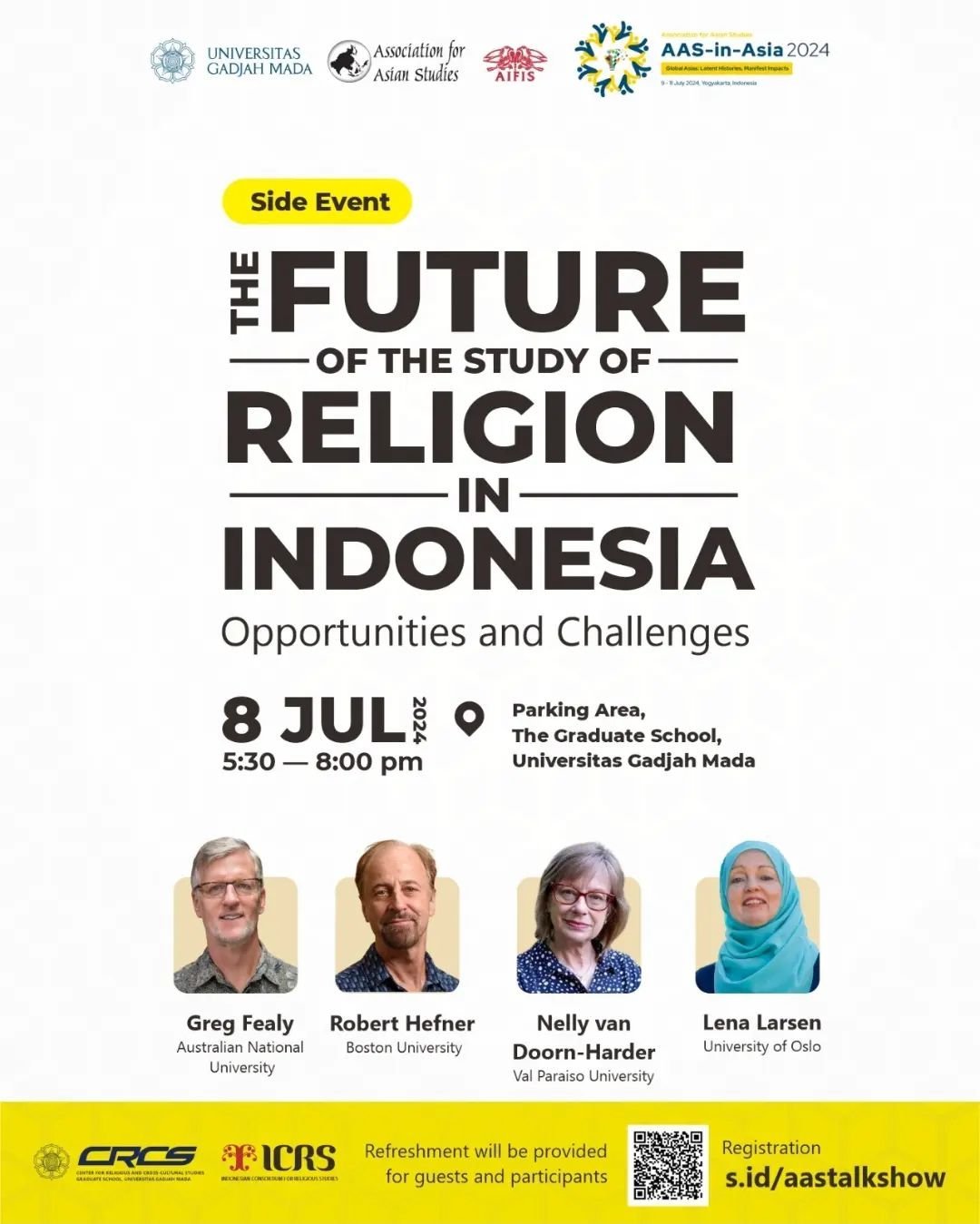Public Talk | IFAR x AIFIS
23rd Annual Linguistics Conference at Atma Jaya University
Welcome to the 23rd Annual Linguistics Conference at Atma Jaya University, Jakarta! Celebrating collaboration and innovation in language studies, this event brings together scholars, researchers, and practitioners to share ideas, discoveries, and the future of linguistics.
More info: https://kolita.atmajaya.ac.id/
Annual Meeting of the Austronesian Formal Linguistics Association
The Austronesian Formal Linguistics Association (AFLA) promotes the study of Austronesian languages from a formal perspective. Since the initial meeting in 1994, AFLA has served as a forum for the presentation of new research in all of the core areas of formal linguistics, including (but not limited to) phonology, linguistic typology, morphology, semantics and syntax. AFLA has a history of bringing together leading scholars, native speaker linguists, and junior scholars in the formal study of Austronesian languages.
Since 1994, AFLA has served internationally as the most prominent and influential venue for presentation and discussion of recent research on Austronesian languages. Research disseminated at AFLA spans all subfields of linguistics (syntax, semantics, phonology, morphology, sociolinguistics, psycholinguistics, language acquisition, historical linguistics, etc).
AFLA32 will be hosted at Atma Jaya Catholic University of Indonesia in Jakarta, Indonesia, from June 2-4, 2025. ISLOJ 10 will be hosted immediately afterward, on June 4-5, 2025.
In addition to the main conference, AFLA 32 and ISLOJ 10 will jointly host an integrated special session on register, which broadly encompasses aspects of the register knowledge of the speakers of a language (such as which alternatives are available) and which situational parameters are relevant (properties of the surroundings, properties of the addressee, purpose of the interaction etc.).
This special session aims to better understand the role of register across languages that explains why certain grammatical variants differ by register, identifying cross-linguistically valid principles of register, and how might these be suitably modelled, taking Austronesian languages in particular, of which several are known to have grammaticalized speech registers or speech levels. For this special session, we especially invite papers along two research tracks. The first track is how overt vs. implicit marking of grammatical features are distributed across registers, and more generally, how the grammatical properties of a language interacts with possibilities of register variation. This could include, for instance, different types of marking via reduplication, forms of address and politeness, or tense-aspect-mood marking, among others. The second track concerns modeling register in multilingual contact situations, with regard to the emergence of contact-induced grammatical variants and register-related language-mixing.
This special session aims to foster initial research within and across Austronesian languages, to relate to current research on register across other languages and across several disciplines (see, for further information, the Collaborative Research Centre 1412 on ‘Register’) sfb1412.hu-berlin.de
More information about AFLA, including locations of past meetings, can be found here. If you have any questions or concerns, please contact the organizing committee at afla32@atmajaya.ac.id
"Indonesia and India in California Festival" (April 19, 2025)
Program supported by an AIFIS-Luce Small Grant.
Illinois State University Workshop, "(Be)Longing: Negotiating Diasporic Identities in Indonesian Contemporary Art" (April 10 & 11, 2025)
Program supported by an AIFIS-Luce Small Grant.
“ART Gado Gado: Expressions of Indonesian Diaspora" (February 22 - March 22, 2025)
Program supported by an AIFIS-Luce Small Grant.
Public Lecture at Sampoerna University, "Sonic Smokescapes: How wildfire haze alters the sounds of Borneo’s forests"
Join us for SU Library’s Info Session: Research Journey from Ideation to Grant with Dr. Wendy M. Erb, PhD! Learn how to turn your ideas into funded research projects.
Dr. Erb is currently conducting fieldwork on "Sonic smokescapes: how wildfire haze alters the sounds of Borneo’s forests.". This research seeks to link soundscape recordings collected through PAM to ground-level air quality measurements recorded at the same locations to study wildlife and their environments across two mosaic landscapes—in Central Kalimantan and East Kalimantan—to assess how biophony (or the sounds of animals) changes in response to dangerous air quality caused by wildfire smoke.
Date/Day : Thursday, 13th February 2025
Venue : SU Library
Time : 02.00 - 04.00 PM
“Human-Machine Symbiosis: AI and the Future of Educational Leadership” (December 24, 2024)
We are delighted to invite you to our AIFIS-FoE UIII Education and Society Lecture Series featuring Khalid Arar, PhD. (Professor in the Education and Community Leadership, School Improvement Doctoral Program at Texas State University), who will speak on the topic: “Human-Machine Symbiosis: AI and the Future of Educational Leadership”.
Speaker: Prof. Khalid Arar, PhD. – Professor Khalid H. Arar is a distinguished scholar in educational leadership and policy, currently serving as a professor in the Education and Community Leadership, School Improvement Doctoral Program at Texas State University. His research focuses on social justice, equity, and diversity within K-12 and higher education, with a particular emphasis on refugee education. Over the past two decades, Prof. Arar has conducted studies across the Middle East, Europe, and North America, contributing significantly to the field through numerous publications in leading educational journals. He has authored and edited several books, including School Leadership for Refugees, which received Routledge’s prestigious Choice Outstanding Academic Title in 2021. In recognition of his contributions, he was awarded the title of Honorary Professor of International Studies at Texas State University and received the AERA Division An Excellence in Research Award in 2023. Prof. Arar also serves on the editorial boards of multiple scholarly journals and is the editor-in-chief of Leadership and Policy in Schools.
Day/Date: Tuesday/December 23, 2024
Time: 09.00-10.30 (Jakarta Time)
Zoom Link:
bit.ly/LunchTalkEdu36 (Password: education)
“Funding for this activity is provided by the Bureau of Educational and Cultural Affairs of the U.S. Department of State through a grant from the Council of American Overseas Research Centers.”
The 360° Animation Video of Rara Janitra
𝐔𝐏𝐉 𝐋𝐞𝐜𝐭𝐮𝐫𝐞𝐫𝐬 𝐖𝐢𝐧 𝐀𝐈𝐅𝐈𝐒 𝟐𝟎𝟐𝟒 𝐆𝐫𝐚𝐧𝐭 𝐟𝐨𝐫 𝐈𝐧𝐧𝐨𝐯𝐚𝐭𝐢𝐯𝐞 𝟑𝟔𝟎° 𝐀𝐧𝐢𝐦𝐚𝐭𝐢𝐨𝐧 𝐨𝐟 𝐈𝐧𝐝𝐨𝐧𝐞𝐬𝐢𝐚𝐧 𝐅𝐨𝐥𝐤𝐭𝐚𝐥𝐞
Universitas Pembangunan Jaya (UPJ) is proud to announce that three of its accomplished lecturers—Clara Evi C. Citraningtyas, Ph.D., Desi Dwi Kristanto, M.Ds., and Slamet Budiharjo, M.A.—have received a prestigious international award, the AIFIS (American Institute for Indonesian Studies) 2024 Grant for their innovative project, The 360° Animation Video of Rara Janitra. This creative adaptation reimagines the traditional Indonesian folktale Rara Jonggrang to reflect contemporary values, such as gender equality and collaboration into its narrative. The Rara Janitra animation is based on a story written by Clara Evi C. Citraningtyas, originally published in 2015 under the same title.
Folktales play a crucial role in informing, instructing, and preparing people to become valuable members of society. However, as societies evolve, many folktales remain unchanged, including a significant number in Indonesia. While many of these stories provide meaningful lessons, others contain dated or even non-productive teachings. The Rara Janitra project addresses this concern by offering a modern retelling of Rara Jonggrang that aligns with today's values while maintaining cultural integrity.
“Folktales should grow with society. Rewriting them and presenting them through modern media ensures they remain relevant and significant, appealing to modern audiences,” said Dr. Citraningtyas.
Created in collaboration with UPJ students, Rara Janitra is presented in English and designed to engage local and global audiences. It utilizes cutting-edge 360° technology to provide an immersive storytelling experience.
A special launch and public screening of Rara Janitra will be held on December 13, 2024, at Theater 1, UPJ Campus. Over 100 attendees are expected, with VR headsets provided for a captivating viewing experience.
The animation will also be uploaded to YouTube to reach broader audiences, inspiring discussions on gender equality, collaboration, and cultural renewal. The project exemplifies how rewriting folktales ensures they evolve with the times, preserving their significance for future generations.
Program supported by an AIFIS-Luce Small Grant.
Meneropong Ornop Perempuan Indonesia Pasca-Reformasi
AIFIS in collaboration with BRIN Political Research Center, invites you to attend a book launch and discussion of "Meneropong Ornop Perempuan Indonesia Pasca-Reformasi," (Observing Indonesian Women’s Non Governmental Organizations After Reformation) published by Kompas.
Zoom link: s.id/ornop.
Zoom Meeting ID: 939 9779 1310.
Passcode: ornop
Watch live on YouTube at BRIN Political Research Center.
Non-governmental organizations (NGOs) managed by women have made significant contributions to advancing civil society, such as increasing participation in politics and decreasing instances of gender-based violence. However, a number of impediments continue to stall this progress, including women’s underrepresentation in leadership roles, limited access to NGO funding, and minimal influence of NGO advocacy adopted within gender policies at the local and national levels. Join us for a book discussion of research and case studies about women changemakers across the US and Indonesia.
Symposium: Papua and Decolonizing Anthropology in Indonesia (Papua dan Dekolonisasi Antropologi di Indonesia)
Symposium: Papua and Decolonizing Anthropology in Indonesia
Please join us this Thursday, October 24, 2024 at Universitas Indonesia campus for an important symposium exploring the push for decolonizing anthropology in Indonesia. This event will examine the colonial legacy of the discipline while envision a new direction by looking thru Papuan history and society.
The symposium is jointly organized by University of Indonesia and University of Wisconsin-Madison, USA, Department of Anthropology. The event is also supported by the American Institute for Indonesian Studies (AIFIS). For registration and confirmation of your attendance please fill the following registration at the following link: https://bit.ly/SIMPOANTROP24
Gamelan Tunas Mekar with "Padayon" FACC Cultural Performance Group
For the third year in a row, Gamelan Tunas Mekar will headline a performance as part of Levitt Pavilion Denver's Free Concert Series. On Sunday, September 22, 2024, Gamelan Tunas Mekar will partner with the Filipino-American Community of Colorado to present a performance of music and dance from Southeast Asia.
This performance is a part of Levitt Pavilion Denver's Free Concert Series: all free series shows are all-ages and they vet and book artists based on artistic merit. For our third time participating in the free concert series, we hope to curate a show and experience that highlights Southeast Asian performance and the arts in the Denver metro area. As part of this event, our intention is to partner with Balinese dancers here in the US, and to bring them to Colorado to perform on Levitt's open-air stage with our ensemble.
This performance will take place on September 22, 2024 at Levitt Pavilion Denver.
All Ages | Rain or Shine
Doors Open: 4:00 PM | Show Start: 5:00 PM
For FREE shows, RSVP is encouraged but walk up entrance is permitted up to venue capacity.
Please review our Rules & Regulations and enjoy these concerts under the stars with your friends and neighbors!
Program supported by an AIFIS-Luce Small Grant.
Bencoolen Public Lecture
AIFIS, in partnership with the Faculty of Law at Universitas Bengkulu, cordially invites you to the 2024 Bencoolen International Public Lecturer event. Prof. Christie S. Warren, director of the Center for Comparative Legal Studies and Post-Conflict Peacebuilding at William & Mary Law School, will be speaking on comparative judiciary power in examining the abusive judicial review phenomenon through the lenses of both the American and Indonesian legal systems.
The event is Free and open to public!
Funding for this activity is provided by the Bureau of Educational and Cultural Affairs of the U.S. Department of State through a grant from the Council of American Overseas Research Centers (CAORC) @caorc_council that is channeled via AIFIS as member of CAORC.
Relevansi Pendidikan Transformatif Hari Ini
AIFIS Executive Director, Dr. Megan Hewitt will join the Kolektif Hysteria for a public talk on "Relevansi Pendidikan Transformatif Hari Ini" Friday, July 19, 2024, free and open to the public!
Pendidikan transformatif memberikan peran krusial dalam mengubah cara berpikir dan bertindak seseorang, memfasilitasi pertumbuhan tidak hanya dalam aspek akademis, tetapi juga dalam pengembangan karakter dan keterampilan sosial.
Melalui pendekatan yang inklusif dan partisipatif, pendidikan ini mendorong siswa untuk berpikir kritis, kreatif, dan berempati, sehingga mereka mampu menghadapi tantangan global dengan solusi yang inovatif. Dengan menciptakan lingkungan belajar yang kolaboratif, pendidikan transformatif membantu membangun masyarakat yang lebih adil dan berkelanjutan, di mana setiap individu merasa berdaya dan siap berkontribusi bagi kebaikan bersama.
New Music from Java
Join us on July 9, 2024 for a special performance from @penicandrarini and @amcgrawrva presenting "New Music from Java".
Free and open to the public
More info: https://aasinasia.ugm.ac.id/portfolio-item/music-performance/
Area Studies Reconfigured and Revitalized: Lessons For and From Indonesian Studies
Join AIFIS on 9 July 2024 for a public roundtable discussion, "Area Studies Reconfigured and Revitalized: Lessons For and From Indonesian Studies." Presented in-conjunction with the AAS-in-Asia conference hosted by Universitas Gajah Mada, this roundtable event is free and open to the public.
Reserve your seat at www.tinyurl.com/aasinasiaroundtable
2nd Annual Field Course in Conservation and Global Health. Pangandaran Nature Reserve, 14-31 July 2024
2nd Annual Field Course in Conservation and Global Health. Pangandaran Nature Reserve, July 14-31, 2024.
The Center for Primate Studies-Bogor Agricultural Institute and the Center for Global Field Study-University of Washington will jointly organize this year's training on "Conservation and Global Health: at the human-environment interface", which will be co-sponsored by AIFIS through a grant from the Council of American Overseas Research Centers @caorc_council.
Instructors:
1. Drh. Huda S Darusman, PhD (IPB)
2. Dr. Ir. Entang Iskandar, MSi (IPB)
3. Prof. Mattew Novak (Central Oregon Community College)
4. Prof. Randall Keys (University of Washington)
5. Dr. Pensri Kyes (Center for Global Field Study, University of Washington)
Researching & Publishing. Keeping Productive Beyond your Graduate Studies
We are delighted to invite you to our AIFIS-FoE UIII Graduate Forum "Researching & Publishing. Keeping Productive Beyond your Graduate Studies" taking place on July 4-5, 2024.
The event will feature three keynote speakers: Prof. Nelly van Doorn-Harder (Professor of Religious Studies, Wake Forest University, North Carolina, USA), Prof. Nina Nurmila, PhD (Dean of the Faculty of Education, UIII), and Dr. Lena Larsen (University of Oslo, Norwegian Center for Human Rights, Program Director).
Time: 08:45 - 12.00 (Jakarta Time)
Venue: Theatre, Faculty A Building, UIII
Funding for this activity is provided by the Bureau of Educational and Cultural Affairs of the U.S. Department of State through a grant from the Council of American Overseas Research Centers
THE 4th SUMMER COURSE "STRATEGIC STUDIES IN BIO-CONSERVATION AND BIOMEDICAL OF PRIMATOLOGY TO SUPPORT SUSTAINABLE ECO-HEALTH AND PRIMATE WELFARE"
Calling all national and international active undergraduate, graduate, postgraduate students, and practitioners/scientists/others! This is your chance to experience a summer course packed with knowledge and insights regarding primates, bioconservation, biomedical on primatology, ethics, and also sampel collection!
Register yourself through: ipb.link/reg-sc2024pssp
Registration is open until 30 June 2024! Don't miss your chance to participate in this summer course and feel free to spread this information to your friends or colleagues!
Funding for this activity is provided by the Bureau of Educational and Cultural Affairs of the U.S. Department of State through a grant from the Council of American Overseas Research Centers.
The Future of the Study of Religion in Indonesia: Opportunities and Challenges
As part of the collaboration, ICRS will host a side event for the conference on July 8, 2024, at the Graduate School of Universitas Gadjah Mada. The event is a public talk with the theme “The Future of the Study of Religion in Indonesia: Opportunities and Challenges.” The invited speakers are Greg Fealy (Australian National University), Robert Hefner (Boston University), Nelly van Doorn-Harder (Valparaiso University), and Lena Larsen (University of Oslo). The event will include dinner and performance from 5:30-8:00 p.m. If you will be in Yogya, please join us (RSVP here: s.id/talkshow).


